七年级上册英语第五单元知识点总结
Unit 5 知识归纳人教版英语七年级上册

Name: ________ Class:______Unit 5 知识归纳一、重点短语。
1.play basketball 打篮球2.play soccer/football 踢足球3.play volleyball打排球4.tennis racket网球拍5.baseball bat棒球棒6.ping-pong bat乒乓球拍7.be late for school上学迟到8.Let’s go! 我们走吧!9.Let me get it. 让我去取吧。
10.L et’s watch TV. 让我们看电视吧。
11.go home 回家12.That sounds interesting/ relaxing/boring/ difficult/good/ great.那听起来很有趣/放松/无聊/困难/不错。
13.go to the same school 上同一所学校14.in different classes 在不同的班级15.at school/ at home在学校/在家16.play with friends 和朋友一起玩17.watch them on TV 在电视上看他们18.It is adj. for sb. to do sth.= Doing sth. isadj. for sb. 做某事对某人来说怎么样19.课后/课前/课中after class/beforeclass/in class20.在教室里in the classroom21.p lay computer games 玩电脑游戏22.p lay/do/have sports 做运动三、作文范文。
My name is Gina. I like doing sports. It is interesting for me.I have eight tennis balls, two volleyballs and five soccer balls, but I don’t have a baseball. I have a good friend Jack. We are in the same school. He has a ping-pong ball and two ping-pong bats. After school, he can play it with his classmates. He thinks it’s relaxing. He likes basketball very much. But he only watches it on TV. It’s difficult.It’s time for sports. Let’s play soccer. Come on!。
七年级英语上册unit5知识点总结
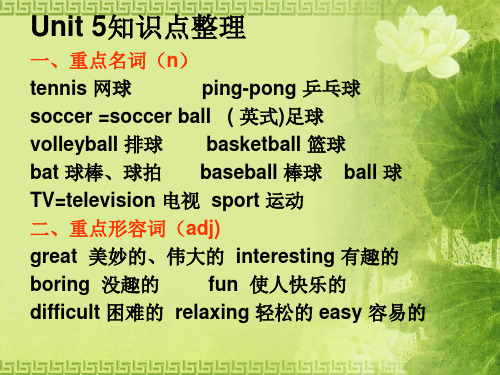
结构为:Do/Does+主+have+其它? 肯回: Yes,主+do/does 否回:No,主+don’t/doeon’t/doesn’t(单三 人称加doesn’t,其它加don’t) 第二步:动词用原形 结构为:主+don’t/doesn’t+have+其它 4、特殊疑问句的变法: 结构为:疑问词+一般疑问句
eg:Math is difficult for Jenny. 数学对于Jenny来说是困难的。 English is interesting for him. 英语对于他来说是有趣的。 It is easy for me. 它对于我来说是容易的。 8、after class 课后 after school 放学后
eg:I have a tennis, but he doesn’t. 5、go to the same school. 去相同的学校 6、with 介词 和……一起 and 连词 和 eg: My classmates and I play pingpong. 我的同班同学和我打乒乓球。 I play ping-pong with my classmates. 我打乒乓球和我的同班同学。 7、Sth+be+形容词+for+sb 某物对于某人来说是……样的
eg:1、I have a baseball. 一、Do you have a baseball? Yes,I do./No,I don’t 否、I don’t have a baseball. 特、What do you have? 2、Jenny has a ping-pong. 一、Does Jenny have a ping-pong ? 否、Jenny doesn’t have a ping-pong. 特、What does Jenny have?
七年级上册英语第五单元知识点

七年级上册英语第五单元知识点本文将介绍七年级上册英语的第五个单元的知识点,包括单词、词组、语法以及阅读理解方面的内容。
一、单词与短语1. offer - 提供2. accept - 接受3. refuse - 拒绝4. polite - 有礼貌的5. impolite - 不礼貌的6. conversation -对话7. invitation - 邀请8. excuse - 借口9. greet - 问候10. introduce - 介绍二、语法知识1. 主语和谓语:在句子中,主语是指动作的执行者,谓语则说明主语的动作。
比如,“Tom plays basketball。
”中,“Tom”就是主语,“plays”就是谓语。
2. 情态动词:情态动词包括can、must、should、may等,用于表示说话人的态度或情感。
例如,“I can play the violin well.”中,“can”表示说话人能够演奏小提琴的能力。
3. 一般现在时:一般现在时用于描述现在的行为或习惯。
例如,“He always studies hard.”中,“studies”是动词的一般现在时。
三、课文阅读课文介绍了两位年轻人在餐厅用餐的情景,主要体现了交际用语方面的知识。
通过课文的学习,学生可以掌握在餐厅点餐、交流的常用语言和表达方式。
四、阅读理解以下是一篇阅读理解文章:John is an American boy. He comes to China with his parents. He wants to make friends with Chinese children. One day, he meets Chen Jie on his way to school. Chen Jie invites John to her home.John's mother tells him to bring some presents when he visits a Chinese family. So, John goes to a store near his hotel and buys some Chinese silk and tea. He puts the presents into his bag. When he arrives at Chen Jie's home, he gives the presents to her parents and says "They are for you." They are very happy and thank him.1. Who does John come to China with?A. His friendsB. His parentsC. His teacherD. His classmates2. What does John buy for Chen Jie's family?A. Some booksB. Some Chinese silk and teaC. Some toysD. Some food3. What do Chen Jie's parents say to John?A. They refuse the presents.B. They don't want to be John's friend.C. They are very happy and thank him.D. They ask John to leave.通过这篇阅读理解文章,学生可以训练自己的阅读理解能力,提高阅读理解的准确度和速度。
七年级英语上册unit5知识点
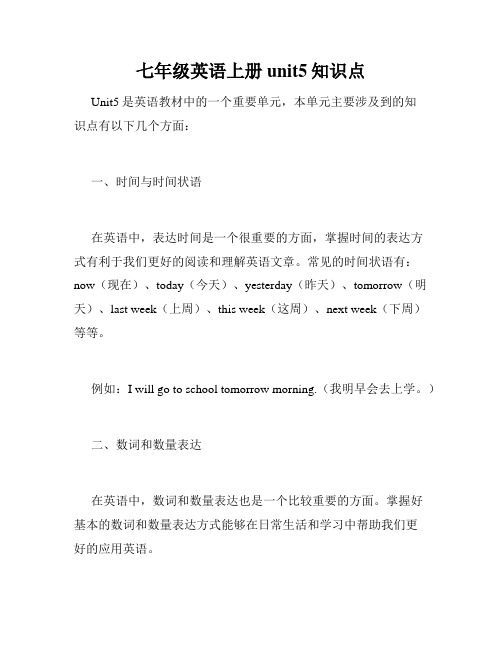
七年级英语上册unit5知识点Unit5是英语教材中的一个重要单元,本单元主要涉及到的知识点有以下几个方面:一、时间与时间状语在英语中,表达时间是一个很重要的方面,掌握时间的表达方式有利于我们更好的阅读和理解英语文章。
常见的时间状语有:now(现在)、today(今天)、yesterday(昨天)、tomorrow(明天)、last week(上周)、this week(这周)、next week(下周)等等。
例如:I will go to school tomorrow morning.(我明早会去上学。
)二、数词和数量表达在英语中,数词和数量表达也是一个比较重要的方面。
掌握好基本的数词和数量表达方式能够在日常生活和学习中帮助我们更好的应用英语。
常见的数词有:one(一个)、two(两个)、three(三个)、four(四个)等等。
常用的数量表达方式有:a few(一些)、many(许多)、a lot of(很多)等等。
例如:I have two brothers and three sisters.(我有两个兄弟和三个姐妹。
)三、情态动词情态动词在英语语法中被称为“Modal verbs”,主要表示说话人对所述情况的态度、看法或建议等等。
常见的情态动词有:can (能够)、could(可以)、may(可以)、might(可能)、must (必须)、should(应该)、will(将会)等等。
例如:You can borrow my bike if you want to.(你如果想的话可以借用我的自行车。
)四、被动语态被动语态在英语语法中被称为“Passive Voice”,在英语中非常常用。
它主要强调的是动作的被动形式,即动作发生的对象而不是动作的主语。
它的一般形式是:be+过去分词。
例如:The book was written by Tom.(这本书是汤姆写的。
)五、情感动词情感动词在英语语法中被称为“Verb of Emotion”,它强调的是说话人的感觉或情感。
七年级上册英语第五单元笔记

七年级上册英语第五单元笔记一、单元概述本单元主要学习如何描述人的外貌和性格特征,以及如何询问和回答有关人的信息。
二、重点词汇1.tall 高的2.short 矮的3.thin 瘦的4.heavy 重的5.long hair 长发6.short hair 短发7.curly hair 卷发8.straight hair 直发9.outgoing 外向的10.quiet 安静的11.friendly 友好的12.smart 聪明的三、重点短语1.be tall/short/thin/heavy 高/矮/瘦/重2.have long/short/curly/straight hair 有长/短/卷/直发3.be outgoing/quiet/friendly/smart 外向的/安静的/友好的/聪明的4.look like 看起来像……5. a little bit + 形容词有点……四、重点句子1.What does he/she look like? 他/她长什么样?2.He/She is tall/short/thin/heavy. 他/她高/矮/瘦/重。
3.He/She has long/short/curly/straight hair. 他/她有长/短/卷/直发。
4.Is he/she outgoing/quiet/friendly/smart? 他/她外向吗?/他/她安静吗?/他/她友好吗?/他/她聪明吗?5.He/She looks like his/her mother/father. 他/她看起来像他/她的妈妈/爸爸。
6.I think he is smart and funny. 我认为他聪明而有趣。
7.She is a little bit quiet. 她有点安静。
8.My friend is very tall and has curly hair. 我的朋友很高并且有着卷发。
七年级上册英语第五单元知识点总结
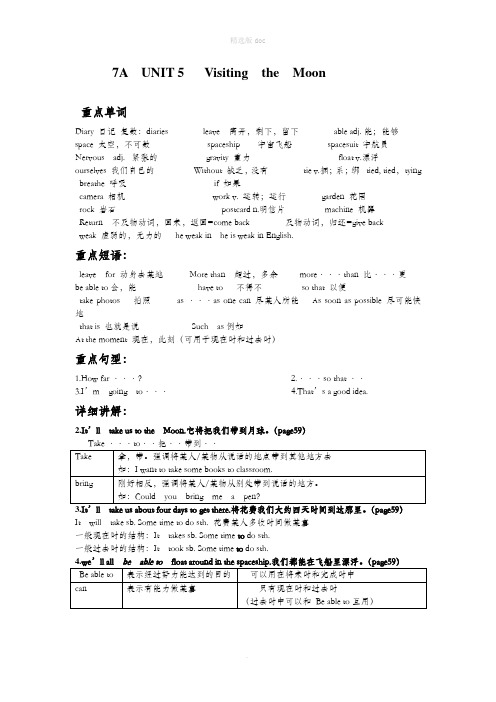
7A UNIT 5Visiting the Moon重点单词Diary 日记复数:diaries leave 离开,剩下,留下able adj. 能;能够space 太空,不可数spaceship 宇宙飞船spacesuit 宇航员Nervous adj. 紧张的gravity 重力float v.漂浮ourselves 我们自己的Without 缺乏,没有tie v.捆;系;绑tied, tied, tying breathe 呼吸if 如果camera 相机work v. 运转;运行garden 花园rock 岩石postcard n.明信片machine 机器Return 不及物动词,回来,返回=come back 及物动词,归还=give backweak 虚弱的,无力的he weak in he is weak in English.重点短语:leave for 动身去某地More than 超过,多余more···than 比···更be able to会,能have to 不得不so that 以便take photos 拍照as ···as on e can 尽某人所能As soon as possible 尽可能快地that is 也就是说Such as例如At the moment 现在,此刻(可用于现在时和过去时)重点句型:1.How far ···?2.···so that ··3.I’m going to···4.That’s a good idea.详细讲解:2.It’ll take us to the Moon.它将把我们带到月球。
(page59)It will take sb. Some time to do sth. 花费某人多收时间做某事一般现在时的结构:It takes sb. Some time to do sth.一般过去时的结构:It took sb. Some time to do sth.4.We’ll have to tie ourselves to our beds so that we won’t float away in our sleep!(page59)我们不得不把我们自己系在床上,以便我们睡着事不会漂走。
七上英语五单元知识点

七上英语五单元知识点【重点短语】1. have a basketball 有一个篮球2. play basketball 打篮球3. have a badminton 有一个羽毛球4. play badminton 打羽毛球5. with our family 和我们的家人一起6. have a tennis racket 有一个网球拍7. play tennis 打网球8. at home 在家9. play sports 做运动10. play computer games 玩电脑游戏11. watch TV 看电视12. in the same school 在同一所学校13. after class 下课后14. go to school 去上学15. at the library 在图书馆16. in the park 在公园17. on the weekend 在周末18. at the restaurant 在餐厅19. at the beach 在海滩20. on the phone 打电话【重点句型】1. —Do you have a ping-pong bat? 你有一个乒乓球拍吗?—No, I don’t. 不,我没有。
2. —Do they have a computer? 他们有一台电脑吗?—Yes, they do. /No, they don't. 是的,他们有。
/不,他们没有。
3 .—Does he have a tennis ball?他有一个网球吗?—Yes,he does. /No, he doesn’t.是的,他有。
/不,他没有。
4. —Do you have a soccer ball? 你有一个足球吗?—Yes, I do. /No, I don't. 是的,我有。
/不,我没有。
5. —Does she have a basketball? 她有一个篮球吗?—Yes,she does. /No, she doesn't.是的,她有。
七年级上册英语Unit5知识点总结(5篇)
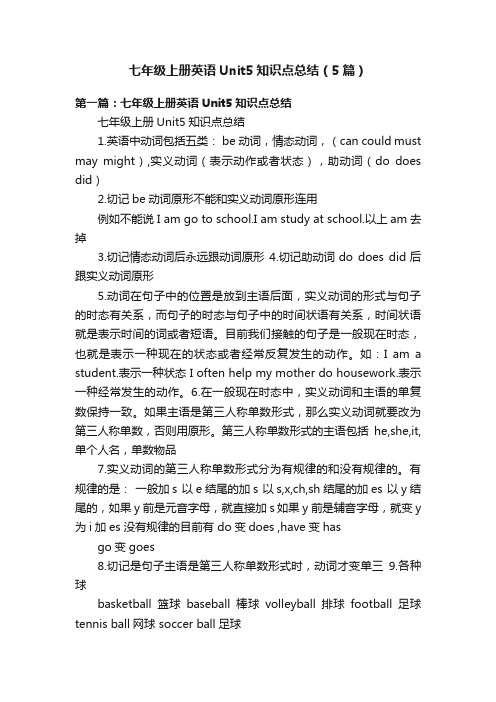
七年级上册英语Unit5知识点总结(5篇)第一篇:七年级上册英语Unit5知识点总结七年级上册Unit5知识点总结1.英语中动词包括五类: be动词,情态动词,(can could must may might),实义动词(表示动作或者状态),助动词(do does did)2.切记be动词原形不能和实义动词原形连用例如不能说 I am go to school.I am study at school.以上am去掉3.切记情态动词后永远跟动词原形4.切记助动词do does did后跟实义动词原形5.动词在句子中的位置是放到主语后面,实义动词的形式与句子的时态有关系,而句子的时态与句子中的时间状语有关系,时间状语就是表示时间的词或者短语。
目前我们接触的句子是一般现在时态,也就是表示一种现在的状态或者经常反复发生的动作。
如:I am a student.表示一种状态 I often help my mother do housework.表示一种经常发生的动作。
6.在一般现在时态中,实义动词和主语的单复数保持一致。
如果主语是第三人称单数形式,那么实义动词就要改为第三人称单数,否则用原形。
第三人称单数形式的主语包括he,she,it,单个人名,单数物品7.实义动词的第三人称单数形式分为有规律的和没有规律的。
有规律的是:一般加s 以e结尾的加s 以s,x,ch,sh结尾的加es 以y结尾的,如果y前是元音字母,就直接加s 如果y前是辅音字母,就变y 为i加es 没有规律的目前有 do变does ,have变hasgo变goes8.切记是句子主语是第三人称单数形式时,动词才变单三9.各种球basketball篮球baseball棒球volleyball排球football足球tennis ball网球 soccer ball足球ping-pong ball乒乓球10soccer和soccer ball的区别 soccer指球类运动soccer ball指具体的那个球 basketball既可以指运动,也可以指具体的一个球11.play+球类运动打篮球play basketball 踢足球play soccer 打排球play voleyball 打网球play tennis打乒乓球play ping-pong切记,一定不能说play soccer ball play tennis ball必须把ball 去掉12.切记play和球类运动之间不加任何词13.句子变否定句:如果有be就在be后加not,如果有can就在can后加not,如果没有be,没有can,就在主语后加don't或者doesn't,选择do还是does和主语有关系,如果主语是第三人称单数形式就选择does 14.Let sb.do sth.让某人做某事 sb用宾格形式do必须用动词原形另一个句型是ask sb.to do sth.15.let's=let us 让我们16.Let's go.让我们走吧!是we的宾格 18.them是they的宾格19.be late for school上学迟到 late是形容词20.has千万不要写成his 21.get去取来,去拿来,得到,买get to+地点到达某地22.great伟大的,好的,棒的 23.play sports做运动24.sound名词,声音,指自然界的声音动词,听起来像That sounds interesting.sound加s是因为主语that是单三千万不要写成That's sounds interesting.25.fun 形容词有趣的名词乐趣,快乐26.interesting主语一般是物某人+interested in sth.某人对某事感兴趣27.同上面一样relaxing的主语是物,relaxed的主语是人28.difficult困难的 different不同的 29.watch TV看电视30.watch的第三人称单数形式是加es 31.same译为相同的,前必须加the go to the same school be in the same school 32.love 和like同样的用法后面跟动词ing形式 love还有名词的意思33.with带有,具有,使用,和……在一起34.only副词,仅仅,只,形容词,唯一的例如:He is only 3 years old.他仅仅3岁。
七年级上册英语第五单元知识点归纳参考
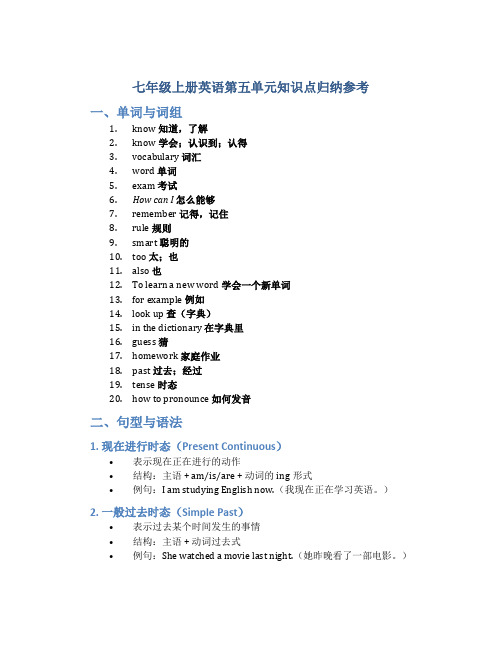
七年级上册英语第五单元知识点归纳参考一、单词与词组1.know 知道,了解2.know 学会;认识到;认得3.vocabulary 词汇4.word 单词5.exam 考试6.How can I怎么能够7.remember 记得,记住8.rule 规则9.smart 聪明的10.too 太;也11.also 也12.To learn a new word 学会一个新单词13.for example 例如14.look up 查(字典)15.in the dictionary 在字典里16.guess 猜17.homework 家庭作业18.past 过去;经过19.tense 时态20.how to pronounce 如何发音二、句型与语法1. 现在进行时态(Present Continuous)•表示现在正在进行的动作•结构:主语 + am/is/are + 动词的ing形式•例句:I am studying English now.(我现在正在学习英语。
)2. 一般过去时态(Simple Past)•表示过去某个时间发生的事情•结构:主语 + 动词过去式•例句:She watched a movie last night.(她昨晚看了一部电影。
)3. 疑问句和否定句•疑问句:把be动词调到句首,否定词在be动词之前–例句:Are you playing football?(你在踢足球吗?)•否定句:在be动词后加not–例句:He is not eating lunch.(他没有吃午饭。
)4. 同类词的比较级和最高级•比较级:形容词+er–例句:Sam is taller than Tom.(山姆比汤姆高。
)•最高级:the+形容词+est–例句:Amy is the tallest student in the class.(艾米是班级里最高的学生。
)三、交际用语1.How can I learn English vocabulary?(我怎样学习英语词汇?)–You can learn English vocabulary by reading books and watching English movies.(你可以读书和看英文电影来学习英语词汇。
七年级上册英语正式篇第五单元知识点

Unit 5. Do you have a soccer ball语法专项一般现在时态中have的用法教材典句:1.Do you have a ping-pong bat Yes, I do .你有一个兵乓球吗?是的,我有。
2.Does he have a soccer ball 他有一个足球吗Yes, he does ./ No, he doesn’t . 是的,他有。
/ 不,他没有。
3.I don’t have a soccer ball ..... 我没有足球.....句1、句2是含有实义动词have的一般疑问句,句3是含有实义动词have的否认句。
下面让我们来学习一下have的具体用法吧!语法全解:1.用法:have意为“有〞表示所属关系,其主语一般是人,强调某人拥有某物,有时也可以用作主语。
一般现在时,当主语是第三人称单数形式时,谓语动词用has,其他人称时,谓语动词都用have。
People have their own hobbies. 人们都有自己的业余爱好。
Tom has three pens . 汤姆有3支钢笔。
助记:have的用法动词have表示“有〞位置就在主语后;“三单〞主语用has, 其他人称用have。
一般疑问句很好变,句首直接把do/ does 添;否认句子也容易,don’t/ doesn’t 加在have/ has前;does/ doesn’t 句中现,has要用have来替换。
2.句式⑴. 肯定句:主语+have/ has+......I have an eraser. 我有一块橡皮。
He has a soccer . 他有一个足球。
⑵. 否认句:主语+don’t/ doesn’t +have ......I don’t have an eraser. 我没有橡皮。
He doesn’t have a tennis racket . 他没有网球拍。
⑶. 一般疑问句:Do/ Does+主语+have....肯定答语:Yes, 主语+do/ does否认答语:No, 主语+don’t/ doesn’tDo you have a bike 你有自行车吗?Yes, I do. / No, I don’t . 是的,我有。
人教版七年级上册英语五单元知识点

Unit 5知识点总结:一、单词及短语1. hobby-爱好2. collect-收集3. stamp-邮票4. postcard-明信片5. coin-硬币6. sticker-贴纸7. keychain-钥匙链8. magazine-杂志9. puppet-木偶10. soccer-足球11. ping-pong-乒乓球12. violin-小提琴13. guitar-吉他14. piano-钢琴15. speak-说话16. play-打、玩17. fly-飞18. read-读二、重点语法1.动词的第三人称单数形式在英语中,当主语是第三人称单数时,动词要加上-s或-es。
例如:He often helps his mother with housework.(他经常帮助他妈妈做家务。
)2.句子的否定形式3.一般疑问句和特殊疑问句一般疑问句是用来征询对方对所说的事情是否同意,一般用助动词do/does,be动词is(are, am),情态动词can等构成。
特殊疑问句是用来询问特殊信息的问句。
a.一般疑问句的构成:肯定句:He is a student. ---> 一般疑问句:Is he a student?否定句:He is not a student. ---> 一般疑问句:Isn't he a student?b.特殊疑问句的构成:特殊疑问句的构成比较固定,一般是由动词be, do, does等引导。
例如:What is your hobby?(你的爱好是什么?)What does he collect?(他收集什么?)三、常用句型1. Do you have any hobbies?2. What's your hobby?3. What do you collect?5. Does he like playing soccer?6. How many stamps do you have?7. I like collecting stamps.8. She doesn't have any postcards.9. He collects coins from different countries.10. I play the guitar every day.四、日常交际用语1. -- What's your hobby?(你的爱好是什么?)-- My hobby is collecting stamps.(我的爱好是收集邮票。
七年级英语上册五单元
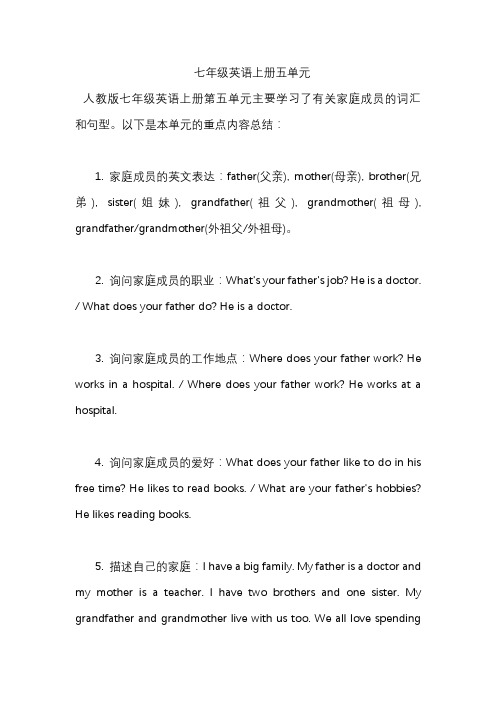
七年级英语上册五单元
人教版七年级英语上册第五单元主要学习了有关家庭成员的词汇和句型。
以下是本单元的重点内容总结:
1. 家庭成员的英文表达:father(父亲), mother(母亲), brother(兄弟), sister(姐妹), grandfather(祖父), grandmother(祖母), grandfather/grandmother(外祖父/外祖母)。
2. 询问家庭成员的职业:What's your father's job? He is a doctor. / What does your father do? He is a doctor.
3. 询问家庭成员的工作地点:Where does your father work? He works in a hospital. / Where does your father work? He works at a hospital.
4. 询问家庭成员的爱好:What does your father like to do in his free time? He likes to read books. / What are your father's hobbies? He likes reading books.
5. 描述自己的家庭:I have a big family. My father is a doctor and my mother is a teacher. I have two brothers and one sister. My grandfather and grandmother live with us too. We all love spending
time together.。
七年级上册英语第五单元知识点总结

七年级上册英语第五单元知识点总结TTA standardization office【TTA 5AB- TTAK 08- TTA 2C】7A U N I T5V i s i t i n g t h e M o o n 重点单词Diary 日记复数:diaries leave 离开,剩下,留下 able adj.能;能够space 太空,不可数 spaceship 宇宙飞船 spacesuit 宇航员Nervous adj. 紧张的 gravity 重力 float v.漂浮ourselves 我们自己的 Without 缺乏,没有 tie v.捆;系;绑 tied,tied,tyingbreathe 呼吸 if 如果camera 相机 work v. 运转;运行 garden 花园rock 岩石 postcard n.明信片 machine 机器Return 不及物动词,回来,返回=come back 及物动词,归还=give backweak 虚弱的,无力的 he weak in he is weak in English.重点短语:leave for 动身去某地 More than 超过,多余 more···than 比···更be able to会,能 have to 不得不 so that 以便take photos 拍照 as ···as one can 尽某人所能 As soon as possible 尽可能快地that is 也就是说 Such as例如At the moment 现在,此刻(可用于现在时和过去时)重点句型:far ··· 2.···so that ··’m going to··· ’s a good idea.详细讲解:2.It’ll take us to the Moon.它将把我们带到月球。
最全面人教版七年级上册英语第五单元知识点归纳总结
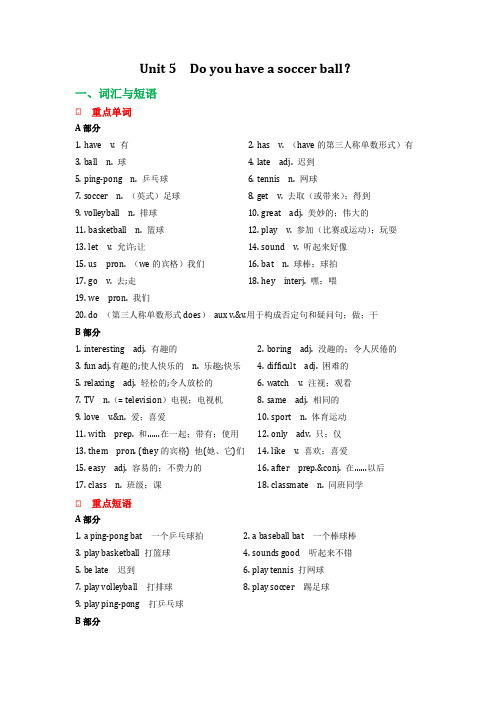
Unit 5 Do you have a soccer ball?一、词汇与短语● 重点单词A部分1.have v. 有2.has v. (have的第三人称单数形式)有3.ball n. 球te adj. 迟到5.ping-pong n. 乒乓球6.tennis n. 网球7.soccer n. (英式)足球8.get v. 去取(或带来);得到9.volleyball n. 排球10.great adj. 美妙的;伟大的11.basketball n. 篮球12.play v. 参加(比赛或运动);玩耍13.let v. 允许;让14.sound v. 听起来好像 pron. (we的宾格)我们16.bat n. 球棒;球拍17.go v. 去;走18.hey interj. 嘿;喂19.we pron. 我们20.do (第三人称单数形式does)aux v.&v.用于构成否定句和疑问句;做;干B部分1.interesting adj. 有趣的2.boring adj. 没趣的;令人厌倦的3.fun adj.有趣的;使人快乐的n. 乐趣;快乐4.difficult adj. 困难的5.relaxing adj. 轻松的;令人放松的6.watch v. 注视;观看 n.(= television)电视;电视机8.same adj. 相同的9.love v.&n. 爱;喜爱10.sport n. 体育运动11.with prep. 和……在一起;带有;使用12.only adv. 只;仅13.them pron. (they的宾格) 他(她、它)们14.like v. 喜欢;喜爱15.easy adj. 容易的;不费力的16.after prep.&conj. 在……以后17.class n. 班级;课18.classmate n. 同班同学● 重点短语A部分1.a ping-pong bat 一个乒乓球拍2.a baseball bat 一个棒球棒3.play basketball 打篮球4.sounds good 听起来不错5.be late 迟到6.play tennis 打网球7.play volleyball 打排球8.play soccer 踢足球9.play ping-pong 打乒乓球B部分1.play computer games 玩电脑游戏2.play volleyball 打排球3.go to the same school 上同一所学校4.watch TV 看电视5.sound interesting 听起来很有趣6.at school 在学校7.with them 和他们一起8.with our friends 和我们的朋友9.watch them on TV 在电视上看它们10.after class 下课后11.watch sports 看体育运动12.in the same school 在同一所学校13.play sth. with sb. 和某人玩某物14.love sports 喜爱运动● 重点句子A部分1.--Do you have a ping-pong bat? --No, I don't.你有一个乒乓球拍吗?不,我没有。
七年级上册英语第五单元知识总结
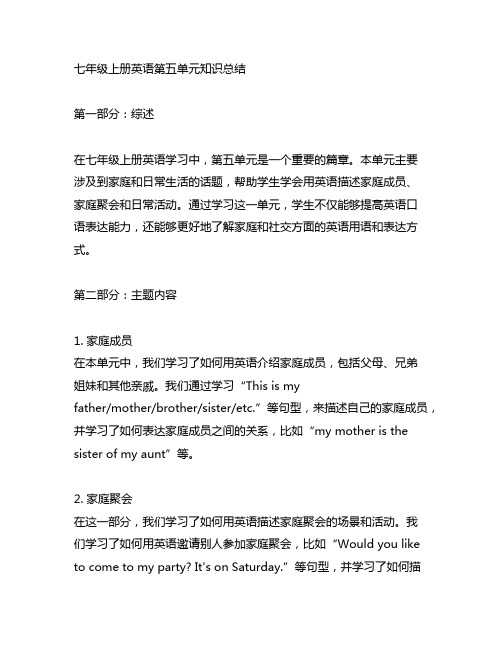
七年级上册英语第五单元知识总结第一部分:综述在七年级上册英语学习中,第五单元是一个重要的篇章。
本单元主要涉及到家庭和日常生活的话题,帮助学生学会用英语描述家庭成员、家庭聚会和日常活动。
通过学习这一单元,学生不仅能够提高英语口语表达能力,还能够更好地了解家庭和社交方面的英语用语和表达方式。
第二部分:主题内容1. 家庭成员在本单元中,我们学习了如何用英语介绍家庭成员,包括父母、兄弟姐妹和其他亲戚。
我们通过学习“This is myfather/mother/brother/sister/etc.”等句型,来描述自己的家庭成员,并学习了如何表达家庭成员之间的关系,比如“my mother is the sister of my aunt”等。
2. 家庭聚会在这一部分,我们学习了如何用英语描述家庭聚会的场景和活动。
我们学习了如何用英语邀请别人参加家庭聚会,比如“Would you like to come to my party? It's on Saturday.”等句型,并学习了如何描述家庭聚会上的食物、游戏和其他活动。
3. 日常活动在这一部分,我们学习了如何用英语描述日常活动,比如起床、吃早餐、上学、做作业等。
我们通过学习“get up, have breakfast, go to school, do homework”等动词短语,来描述自己的日常生活,以及询问别人的日常活动。
第三部分:个人见解通过学习七年级上册英语第五单元的内容,我发现英语不仅仅是一门语言,更是一种沟通的工具和交流的桥梁。
通过学习这一单元,我不仅能够更好地用英语表达自己的家庭和日常生活,还能够更好地了解和交流他人的家庭和日常生活。
这也激发了我对英语学习的兴趣,让我更愿意用英语来探索世界和交流思想。
总结:七年级上册英语第五单元是一个重要的篇章,通过学习这一单元的内容,学生能够更好地理解家庭和日常生活的英语表达方式,提高英语口语表达能力,激发对英语学习的兴趣。
七上英语第五单元知识点归纳

七上英语第五单元知识点归纳七年级上册英语第五单元的知识点归纳主要包括以下几个方面:一、词汇:1. 动词:如“have”(有)、“do”(做)、“play”(打/踢)、“go”(去)等。
2. 名词:如“soccer”(足球)、“basketball”(篮球)、“volleyball”(排球)、“tennis”(网球)、“ping-pong”(乒乓球)、“bat”(球棒)、“club”(俱乐部)等。
3. 形容词:如“interesting”(有趣的)、“boring”(无聊的)、“fun”(有趣的/使人快乐的)、“difficult”(困难的)等。
4. 代词:如“our”(我们的)、“their”(他们的)等。
二、短语和固定搭配:1. “play sports”意为“进行体育运动”。
2. “play + 球类名词”意为“打……球”。
3. “be good at + doing sth.”意为“擅长做某事”。
4. “be ready to do sth.”意为“准备做某事”。
5. “join sb. in (doing) sth.”意为“和某人一起做某事”。
6. “like to do/doing sth.”意为“喜欢做某事”。
三、语法:1. 情态动词“can”的用法:表示能力,意为“能/会”,后接动词原形。
否定形式为“can't”。
2. 动词的现在分词形式:通常在动词后加“-ing”。
3. 一般现在时:表示经常发生的动作或存在的状态,常与频度副词连用。
主语为第三人称单数时,动词要用第三人称单数形式。
4. 陈述句和疑问句的转换:陈述句变疑问句时,要将系动词、情态动词或助动词移至主语前,并注意人称和数的变化。
陈述句变否定句时,要在系动词、情态动词或助动词后加not。
5. 物主代词的用法:形容词性物主代词后跟名词,名词性物主代词后不跟名词。
两者在人称和数上要保持一致。
6. 不定冠词a/an的用法:用于可数名词单数前,表示泛指。
七年级上册英语五单元知识点总结
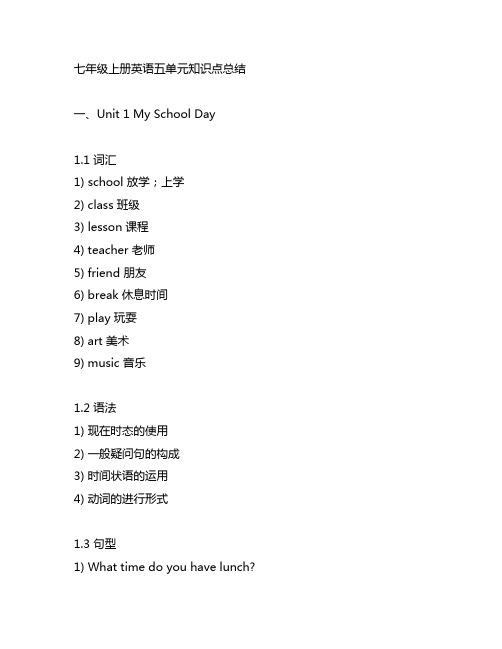
七年级上册英语五单元知识点总结一、Unit 1 My School Day1.1 词汇1) school 放学;上学2) class 班级3) lesson 课程4) teacher 老师5) friend 朋友6) break 休息时间7) play 玩耍8) art 美术9) music 音乐1.2 语法1) 现在时态的使用2) 一般疑问句的构成3) 时间状语的运用4) 动词的进行形式1.3 句型1) What time do you have lunch?2) When do you have art?3) Do you play football at break time?二、Unit 2 My Favourite Season2.1 词汇1) season 季节2) summer 夏天3) autumn 秋天4) winter 冬天5) spring 春天6) hot 炎热的7) cold 寒冷的8) weather 天气2.2 语法1) 形容词的比较级和最高级2) 物主代词的使用3) there be 句型的运用2.3 句型1) What's your favourite season?2) Which season do you like best?3) How's the weather in spring?三、Unit 3 My Weekend3.1 词汇1) weekend 周末2) Saturday 星期六3) Sunday 星期日4) go shopping 去购物5) watch TV 看电视6) playputer games 玩电脑游戏3.2 语法1) 一般现在时的肯定句、否定句和疑问句2) 频度副词的使用3) 动词短语的运用3.3 句型1) What do you do at the weekend?2) How often do you playputer games?3) Do you go shopping on Sundays?四、Unit 4 My Favourite Things4.1 词汇1) colour 颜色2) red 红色3) blue 蓝色4) white 白色5) green 绿色6) yellow 黄色7) black 黑色8) pink 粉色9) orange 橙色4.2 语法1) 形容词的位置2) be 动词的肯定句、否定句和疑问句3) 介词的使用4.3 句型1) What's your favourite colour?2) Is it red or blue?3) Do you like black or white?五、Unit 5 My Family5.1 词汇1) family 家庭2) father 父亲3) mother 母亲4) brother 兄弟5) sister 姐妹6) grandparents 祖父母7) uncle 叔叔8) aunt 阿姨5.2 语法1) 形容词的所有格2) 名词的复数形式3) 物主代词的所有格形式5.3 句型1) How many people are there in your family?2) What's your uncle's name?3) Are your grandparents old?总结七年级上册英语五单元涵盖了日常生活中常见的话题,包括学校生活、季节、周末活动、喜爱的事物和家庭成员等。
七年级上册unit5知识点总结

七年级上册unit5知识点总结本篇文章总结了七年级上册英语第五单元的重点知识,包括词汇、语法、听力和口语练习等方面。
希望对学生们巩固知识、提高水平有所帮助。
一、词汇1. 颜色:red, blue, green, yellow, purple, black, white, orange, brown, pink2. 衣服:shirt, T-shirt, skirt, pants, dress, hat, socks, shoes, coat, sweater3. 学科:math, English, geography, biology, history, art, music, PE4. 人物:teacher, student, father, mother, sister, brother, friend, family, cousin, grandparents二、语法1. be动词用法(am, is, are):用于描述人或事物的状态,第一人称用am,第二和第三人称用is和are,例如:I am a student. He is my teacher. They are my classmates.2. have的用法:用于表示拥有某物或进行行为,例如:I have a book. She has a pencil. They have lunch at 12 o'clock.3. There be句型:用于描述某个地方或场所有什么事物,例如:There is a park near my house. There are many trees in the park.4. 名词所有格:表示某物是谁的,例如:My father's car. The students' books.三、听力和口语练习1. 听力训练:通过听音频或录音练习听力,学生们可以提高对于口语、听力的敏感度,从而更好地进行口语练习和交流。
七年级上册英语unit5知识点总结归纳
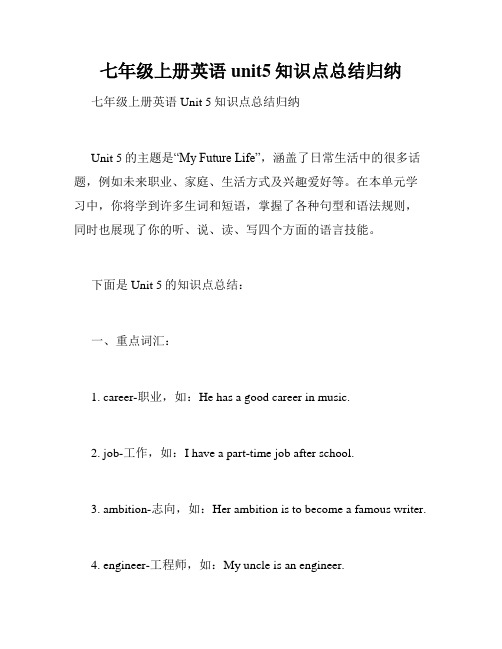
七年级上册英语unit5知识点总结归纳七年级上册英语Unit 5知识点总结归纳Unit 5的主题是“My Future Life”,涵盖了日常生活中的很多话题,例如未来职业、家庭、生活方式及兴趣爱好等。
在本单元学习中,你将学到许多生词和短语,掌握了各种句型和语法规则,同时也展现了你的听、说、读、写四个方面的语言技能。
下面是Unit 5的知识点总结:一、重点词汇:1. career-职业,如:He has a good career in music.2. job-工作,如:I have a part-time job after school.3. ambition-志向,如:Her ambition is to become a famous writer.4. engineer-工程师,如:My uncle is an engineer.5. accountant-会计师,如:She wants to be an accountant when she grows up.6. lawyer-律师,如:John's dad is a lawyer.7. artist-艺术家,如:She is a famous artist in our town.8. musician-音乐家,如:He is a famous musician in our country.9. architect-建筑师,如:My cousin is studying to become an architect.10. scientist-科学家,如:Albert Einstein was a great scientist.二、重点短语:1. in the future-在未来,如:What do you want to be in the future?2. be interested in-对…感兴趣,如:She is interested in science.3. do research-进行研究,如:They are doing research on new medicine.4. make a decision-做出决定,如:You need to make a decision about your future.5. graduate from-毕业于,如:She wants to graduate from a famous university.6. get a degree-获得学位,如:He hopes to get a degree in business.7. dream of-梦想成为,如:She dreams of becoming an actress.8. take a course-参加课程,如:He is taking a math course this semester.9. attend a college-上大学,如:She wants to attend a college in California.10. apply for-申请,如:He is applying for a job in New York.三、重点句型:1. What do you want to be in the future?(你将来想成为什么?)这是问别人职业志向的常见句型。
- 1、下载文档前请自行甄别文档内容的完整性,平台不提供额外的编辑、内容补充、找答案等附加服务。
- 2、"仅部分预览"的文档,不可在线预览部分如存在完整性等问题,可反馈申请退款(可完整预览的文档不适用该条件!)。
- 3、如文档侵犯您的权益,请联系客服反馈,我们会尽快为您处理(人工客服工作时间:9:00-18:30)。
七年级上册英语第五单元知识点总结
集团文件版本号:(M928-T898-M248-WU2669-I2896-DQ586-M1988)
7A UNIT 5 Visiting the Moon
重点单词
Diary 日记??复数:diaries leave 离开,剩下,留下
able adj.?能;能够
space 太空,不可数 spaceship 宇宙飞船
spacesuit 宇航员
Nervous adj.? 紧张的 gravity 重力
float v.漂浮
ourselves 我们自己的 Without 缺乏,没有 tie v.捆;系;绑? tied,?tied,?tying
breathe 呼吸 if 如果
camera 相机 work v. 运转;运行
garden 花园
rock 岩石 postcard n.明信片
machine 机器
Return 不及物动词,回来,返回=come back 及物动词,归还=give back
weak 虚弱的,无力的 he weak in he is weak in English.
重点短语:
leave for 动身去某地 More than 超过,多余more···than 比···更
be able to会,能 have to 不得不 so that 以便
take photos 拍照as ···as one can 尽某人所能 As soon as possible 尽可能快地
that is 也就是说 Such as例如
At the moment 现在,此刻(可用于现在时和过去时)
重点句型:
1.How far ···?
2.···so that ··
3.I’m going to···
4.That’s a good idea.
详细讲解:
2.It’ll take us to the Moon.它将把我们带到月球。
(page59)
Take ···to··把··带到··
3.It’ll take us about four days to get there.将花费我们大约四天时间到达那里。
(page59)
It will take sb. Some time to do sth. 花费某人多收时间做某事一般现在时的结构:It takes sb. Some time to do sth.
一般过去时的结构:It took sb. Some time to do sth.
4.we’ll all be able to float around in the spaceship.我们都能在飞船里漂浮。
(page59)
4.We’ll have to tie ourselves to our beds so that we won’t float away in our sleep!(page59)
我们不得不把我们自己系在床上,以便我们睡着事不会漂走。
have to 必须,不得不,后面加动词原形。
3.feed sth. to sb.中的feed后加的是食物,to 后加的是动物或者小孩“用食物喂某人或动物”
feed sb. On sth. 中feed后加人或动物名称,on后加食物“给某人或动物喂点食物”
4.We will be able to build hotels there in the future.在将来我们将能在那里建造旅馆(page68)
in future
in the future 巧计:这个的单词组成较长,所以时间范围也比较长
5.Thousands of years ago ,there was a Chinese story about Chang’e flying to the Moon.(page70)几千年前,有一个嫦娥奔月的中国传说。
Thousands of 数以千计的
①Hundred (百),Thousand(千),million(百万)等用复数形式修饰时要有··of+复数名词,前面不能加具体的数字。
②Hundred ,Thousand,million,billion(十亿)前面如有具体数字,不能在他们后面加“s”
Grammar
一般将来时:表示将来某个时间要发生的动作或者存在的状态,常与一些表示将来的时间的状语连用。
1.基本结构:一般由“助动词will+动词原形”或者“be going to +动词原形”构成。
2.注意:will是助动词,不能独立使用,前面的主语无论是什么人称,后面都是will。
它的否定形式是will not,缩写为won’t.
3.时间状语:tomorrow,next time/week ,in a month/week,from now on ,soon.
4.基本句型:
(1)肯定句:主语+will/be going to +动词原形+其他
如:He will come here at onc.
(2)否定句:主语+won’t/be not going to +动词原形+其他
如:He will not go to Shenzhen.
(3)一般疑问句:Will+主语+动词原形+其他?
Be(am,are,is)+主语+动词原形+其他?
如:Will you help me with my English
11. Are you going to of Shenzhen
12. (4)特殊疑问句:疑问词+一般疑问句?
13. What will the students have for breakfast?
5.will 和be going to 的区别:
(1)will :与主观意图无关的将来,表示必然要发生的客观规律。
如:The flowers will come out in a few days.
14.(2)be going to:一般表示计划、打算或准备要做的事情,和有迹象将要发生或者肯定要发生的事情。
如:Look!It’s going to rain.。
